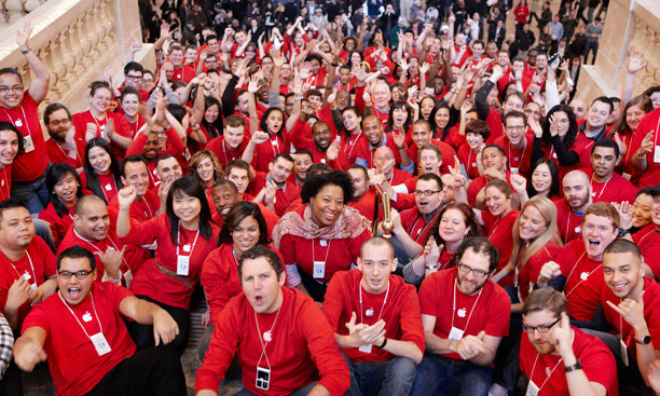According to court documents unsealed on Wednesday, Apple CEO Tim Cook received personal emails from Apple Store employees regarding bag check policies instituted for security purposes, calling the searches "embarrassing," "demeaning" and "disturbing."
As reported by Reuters, Cook received multiple personal emails from staff speaking out against company policy that forced employees to undergo personal bag checks before exiting an Apple Store.
One worker, whose name was redacted from the filing, told Cook in 2012 that Apple Store managers "are required to treat 'valued' employees as criminals." Bag checks are commonly implemented in the retail world to prevent employee theft, though many companies shield such procedures from the public by performing checks behind the scenes or requiring staff use clear bags.
Cook responded by forwarding the email or emails to retail and human resources executives, asking, "Is this true?" Responses to Cook's email were not made public, but the filing did contain correspondence between other Apple executives, including VP of human resources Denise Young Smith.
"If it is simply a deterrent there has to be a more intelligent and respectful way to approach," Smith said in an email.
Employees first filed a class action lawsuit against Apple in 2013, claiming lost wages over the company's bag search policy. The suit notes hourly retail workers were required to submit to "personal package and bag searches" when clocking out, which led to unpaid wait times between 10 and 15 minutes at the end of every shift. Another five minutes went uncompensated for meal breaks.
Presiding U.S. District Court Judge William Alsop dismissed the case with prejudice in December, but plaintiffs Amanda Frelkin, Taylor Kalin, Aaron Gregoroff, Seth Dowling and Debra Speicher consolidated their cases and are seeking class certification.
A court hearing to determine plaintiffs' motion for certification is scheduled for July 2.
 Mikey Campbell
Mikey Campbell







-m.jpg)






 Marko Zivkovic
Marko Zivkovic
 Christine McKee
Christine McKee
 Andrew Orr
Andrew Orr
 Andrew O'Hara
Andrew O'Hara
 William Gallagher
William Gallagher

 Mike Wuerthele
Mike Wuerthele
 Bon Adamson
Bon Adamson




-m.jpg)



132 Comments
What's interesting is that John Browett was vice president of retail operations at Apple from April 2012 until October 2012, approximately the time when the first emails (reported by the linked Reuters article) to Tim Cook was sent. It's also interesting that the complaints continued into 2013, after Browett was fired.
Deadbeats!
Many retailers have similar policies, and, as intrusive as they may feel, many retailers also experience significant theft from employees! I never stole anything from any employer, but I'm sure they all lost some things from time to time! As to the allegations that they had to wait too long, that's pure nonsense! Any employer I worked for, including Apple, never took more than a couple of minutes to get me out the door!
Rediculous... Absolutely normal practice for almost ALL retail! You guys aren't special just because you work for Apple! Although yes, they should have been getting paid for it. You definitely can't blame Apple with the price of Apple watches and the size.
Products are getting thinner and smaller AND more expensive ... witness the gold ?watch at +$10K. By the time Apple releases the iBurger, lord only knows how small and how expensive it may be. A person could slip out with a whole snoot-ful of iBurgers....